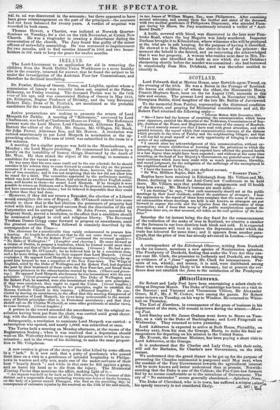SCOTLAND.
Lord Polwarth died at Merton House, near Berwick-upon-Tweed, on. the evening of the 28th. He was a Baron in the Peerage of Scotland. He leaves six children ; of whom the eldest, the Honourable Henry Francis Hepburn Scott, born on the 1st August 1796, succeeds to the title and estates. The present Lord married, in November 1835, ma& Georgians Baillie, third daughter of the late Mr. Baillie of Jerviswooa
To the memorial from Paisley, representing the distressed condition of the district, and praying for Ministerial consideration and aid, Sir Robert Peel returned the following reply
Drayton Manor, 25th December 1841.
" Sir—I have had the honour of receiving the communication which bears your signature entitled the Memorial of the Noblemen, Commissioners of Supply, Justices of the Peace, and Magistrates of towns of the county of Renfrew. " I need scarcely assure you that I have read with great attention, and with painful interest, the report which that communication conveys of the distress which prevails in the town of Paisley and the neighbouring villages; and that I will not fail to avail myself of an early opportunity of bringing it under the notice of my colleagues.
" I cannot close my acknowledgment of this communication, without expressing my sincere satisfaction at learning that the privations to which the labouring classes have been necessarily exposed have affected the general health in a less degree than might have been expected ; and without at the same time recording, as the head of her Majesty's Government, my grateful sense of those local exertions which have been made with so much perseverance, liberality, and sound judgment, for the mitigation of the sufferings of the unemployed III the neighbourhood of Paisley.
" I have the honour to be, Sir, your obedient servant, " Sir Wm. Milliken Napier, Bart. tke." "ROBERT PEEL."
Replies have been received in Edinburgh from Mr. Villiers and Mr. Hume, declining to attend the Anti-Corn-law Conference to be held there. Mr. Villiers says that professional engagements and ill health keep him away. Mr. Hume's reasons are more solid
" I am desirous," he says, " that each community should act at the public meetings by their local residents, without the assistance of strangers. I hear the opponents to the repeal of those laws complain that the sense of the several communities where meetings are held is not known, as strangers are put forward to expose the evils and the injuries from the continuance of these monopolies; and I know that many of the public manifestations against the Provision-laws are, on that account, not taken as the real opinions of the localities."
Saturday the 1st instant being the day fixed for the commencement of the reduction of the make of iron in Scotland, we observe a number of the furnaces in our iron-districts look bleak and cold. It is expected that this measure will tend to relieve the depression under which the trade has laboured for some time • and it appears from another paragraph, that the price of iron has already advanced in London.—Glasgow Chronicle.


























 Previous page
Previous page